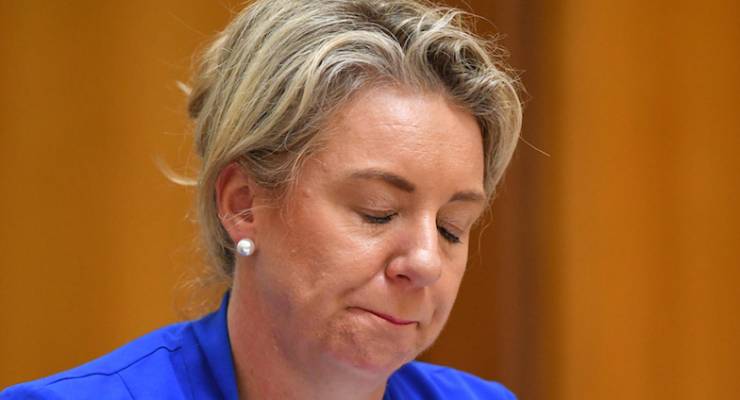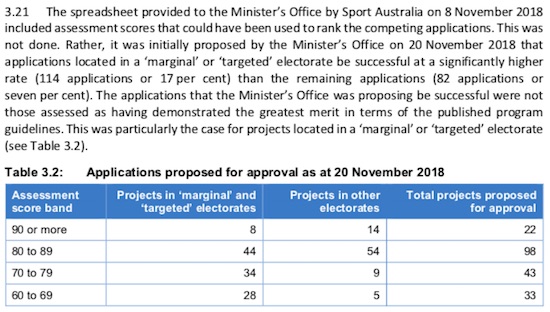
Ros Kelly can finally relax: a quarter century after the “sports rorts” affair ended her political career, there’s a new sports grants rort that dwarfs hers, the details of which have been forensically dissected by the Australian National Audit Office (ANAO).
The offender? Nationals Senator Bridget McKenzie and her office, which systematically abused the $100 million Community Sport Infrastructure Program, ostensibly administered by the Australian Sports Commission, to help the government’s 2019 election campaign.
The ANAO’s analysis was prompted by a referral from Labor’s Mark Dreyfus after serial Liberal failure Georgina Downer presented a novelty cheque to a bowling club in the electorate of Mayo before last year’s election. It outlines the extraordinary ways in which legal and procedural hurdles to the partisan abuse of the grant program were overcome by ministerial staff.
Here’s how they did it:
1. Avoid the rules
It’s harder to rort grants these days because the Commonwealth Grant Rules and Guidelines (CGRGs) apply to public service agencies and all non-corporate public bodies. So the first step was to select an agency that wasn’t bound by the CGRGs. The Sports Commission, or “Sport Australia” as it brands itself, is a notionally independent corporate entity so the CGRGs don’t apply.
But there was a problem — under its act, if the Sports Commission hands out grants, it has to decide who gets them. The Commission’s portfolio department, Health — which played a key role in this scam — told the commission that McKenzie would be deciding who got grants, thanks very much.
But how? Under section 11 of its act, the commission can be directed by the minister, but only after an extensive process. So what did McKenzie and Health do to make sure she would decide, not the commission?
They simply ignored the law. The ANAO explains:
In early June 2018, Sport Australia recorded that adherence to the ASC act required that it, not the minister, approve the award of CSIG funding… The guidelines published on 2 August 2018 identified that the minister would approve CSIG funding…
Throughout the granting process all parties acted as if the minister was able to be the approver. No section 11 directions were issued to Sport Australia in 2018-19. In the absence of a section 11 direction, there was no legal authority evident to the ANAO under which the minister was able to be the approver of CSIG program grants to be paid from the money of Sport Australia.
McKenzie had no legal authority to hand out a single dollar of the $100 million in grants.
2. Allow late and amended applications
One of the cardinal rules of Commonwealth administration is to never treat applicants — whether for grant applications or participants in a request for tender — differently. But McKenzie’s office demanded that the commission accept nine applications that were either late or were amended by the participants after the deadline, despite the commission specifically telling them it was in breach of the program guidelines.
All nine dodgy applications were funded, and eight of them were funded when projects that ranked higher on the commission’s proper assessment weren’t funded.

3. Ignore the commission’s own assessment
The big problem facing McKenzie’s office was that the commission would assess applications on their merits, rather than according to the Coalition’s political needs.
So McKenzie’s office asked for a full spreadsheet of applications, but once the commission completed its assessment and it was approved by the commission board, McKenzie’s office warned them not to send that approved list, ostensibly on the basis that more funding was coming from the government.
Instead, her office sent the commission its assessment. As the ANAO notes, the commission’s formal list of approved grants was never sent.

4. Allocate grants based on election campaign needs
With the merit-based application process stymied, McKenzie’s office then ran its own “parallel assessment process as a basis for the minister deciding which projects should be funded with additional analysis on ‘marginal’ electorates held by the Coalition as well as those electorates not held by the Coalition that were to be ‘targeted’ in the 2019 election”.
The results of this assessment were substituted for the commission assessment it refused to accept from the board.

5. Make the rort worse with each round
Having worked out how to rort the grants, McKenzie’s office then applied their knowledge to ramp up the rorting in the two rounds that followed the initial approvals.
The ANAO’s dry analysis demonstrates how the office got better at rorting. In the first round, “91 (41%) of the approved projects were not on the list of 426 endorsed by the Sport Australia board”. In the second round, the figure was 70%. In the third round, it was 73%.
That is, as the 2019 election neared, nearly three-quarters of money handed out in the third round of a $100 million program was done so on the basis that it helped the Coalition — not whether the grant applications were worthwhile.
In the history of rorted grants on both sides of politics, Bridget McKenzie and her office stand out as the most blatant of all. They assiduously and forensically worked out the best way to funnel taxpayer money to help the Coalition win. They picked an agency outside the rules, they ignored laws they impeded them, and simply overrode merit-based assessment to look after themselves. And they didn’t — and don’t — care who knew.








If I, Joe Citizen, defrauded the Commonwealth of $150 or more, I could expect to be wearing the broad arrow. The Robo-debt victims would know all about threats of jail time. This minister is proud of committing a fraud of tens of millions of dollars. It is astounding.
It would be interesting to know more about the high priority applications that were ignored. Are they from indigenous communities, for instance? Or from other low-income suburbs?
If I, Joe Citizen, doesn’t exist ..it’s a commodified consumtable consumer client customer unit of the corporatized State.ptyltd.inc.com of Australia.com.au you may be thinking of..
If only there was some sort of Independent commission against corruption.
Shit, no wonder the COALition don’t want a retrospective ICAC……or one with power to investigate politicians. They’d all end up in jail within a year.
Well it didn’t get Georgina over the line, at least. I’m wondering though it was clearly bad value for sport, bad for Australia, but was it actually of value to the Coalition? We know the funding was rorted, clearly, but did it actually deliver swings in proportion to the funding? Or is sports funding like stadiums and road projects, really popular with politicians but abysmal returns. Could someone kindly analyse this?
So it started back before June 2018 – Turnbull’s government was just as corrupt as Morrison’s is proving to be. Who’d’ve thought it was possible?